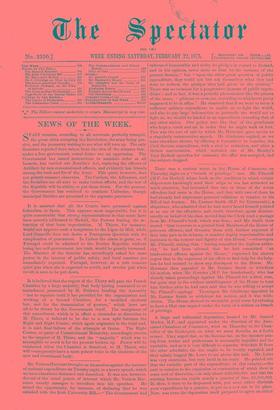Mr. Vernon IIarcourtbronght on his motion against the increase of
national expenditure on Tuesday night, in a heavy speech, which we have elsewhere discussed and described. It was not, however, devoid of the usual points of interest which Mr. Vernon liar- " court usually manages to introduce into his speeches. He seized the opportunity, for instance, of declaring that he was .satisfied with the Irish University Bill,—" The Government had
redeemed honourably and nobly its pledges in regard to Ireland, and in his opinion, never more so than by the measure of the present Session," but " upon the other great question of public expenditure, they could not but ask themselves what they had done to redeem the pledges they had given to the country." There was no occasion for a progressive increase of public expen- diture ; and in fact, it was a periodic phenomenon like the phases of the moon, " gibbous or crescent, according to whichever party happened to be in office." He observed that if we were to incur a sufficient military expenditure to enable us to fight the world, and also to pay large indemnities to persuade the world not to fight us, we should be landed in an expenditure exceeding that of any other nation. Our policy was like that of the gentleman who kept a coach and six in order that he might walk on foot. This was the sort of salt by which Mr. Harcourt gave savour to a singularly uninstructive speech. Mr. Gladstone replied, as we have elsewhere shown, by offering a Committee to consider the Civil Service expenditure, with a view to reduction, and after a lifeless conversation, which included one of Mr. Henley's Tory-Radical speeches for economy, the offer was accepted, and the subject dropped.


































